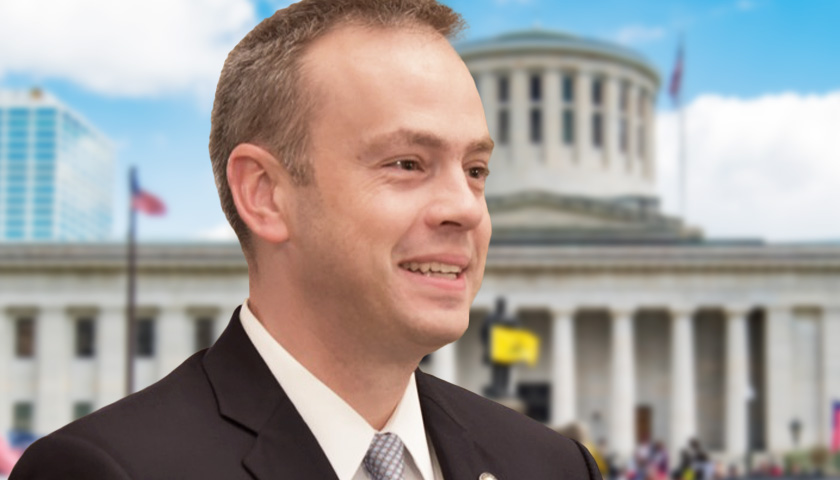Ohioans may soon get protections from fertility fraud after the Senate passed a major criminal justice reform bill.
A 27-2 bipartisan vote sent Senate Bill (SB) 288 sponsored by State Senator Nathan Manning (R-North Ridgeville) to the House where lawmakers will consider it further prior to sending it to Governor Mike DeWine for final approval.
“Some of the aspects of this bill will be labeled as tougher on crime. Increasing penalties and looking at ways to make sure that our society is safe in the short term. A lot of this bill is long-term and making sure that people that have entered our judicial system, exit the judicial system as better people,” Manning said.
The bill focuses on various parts of criminal law regarding crimes, correctional facilities, trial procedures, correctional officers and employees, coroner records, inmate internet access, and civil protection orders. It also includes provisions for delinquent child adjudications and case transfers, youthful offender parole review, traffic offenses, certificates of qualification for employment, licensing collateral sanctions, criminal record sealing and expungement, State Criminal Sentencing Commission duties, and certain assisted reproduction matters.
One assisted reproductive matter included in the bill’s language is fraudulent/nonconsensual assisted reproduction. This includes when a physician uses reproductive material from a person or source that the parties receiving the procedure did not consent to also known as fertility fraud. An example of this is a physician using his sperm to fertilize the egg of one of his patients, regardless of the patient only consenting to use the sperm of a different donor.
Ohio law does not currently prohibit a doctor from using his sperm to impregnate or other misrepresentations about the donor. It also provides no legal recourse for women or their children who find out years later.
SB 288 asserts that if a licensed health care professional knowingly uses human reproductive material from a donor that the recipient of the procedure has not consented to, that constitutes a third-degree felony. Additionally, the bill allows for the woman on whom the procedure was performed, her spouse, or the child born as a result of the procedure to bring a civil action against the fertility doctor. The court must also notify any professional licensing board of the health care professional if they plead guilty or are convicted.
In the House Criminal Justice Committee Wednesday, Manning said he found out this was happening by watching the 2019 Netflix documentary, “Our Father.” Manning was shocked to find out that these actions are not illegal in the state.
Our Father shares the story of a fertility doctor, Donald Cline, who impregnated women with his sperm without their consent. It details a woman who discovers that she has 90 half-siblings all fathered by Cline.
“This is something I was not aware of. It was shocking to me that this was happening and even more shocking that under the law, with talking to prosecutors and legal experts, that this was not illegal,” Manning said.
State Representative Jena Powell (R-Arcanum) said this provision in the bill is to provide families protection and peace of mind.
“We are striving to create a culture of life here in Ohio. That includes ensuring that every husband and wife growing their family with ART (assisted reproductive technologies) has the peace of mind and confidence to know that their fertility doctor will not knowingly impregnate the woman with his own or incorrect sperm,” Powell said.
Carrie Lauterbach, from Oakwood, Ohio, testified in favor of the legislation because she is not only a product of fertility fraud but also a medical professional.
Lauterbach said she took a direct-to-consumer DNA test and found that she had six half-siblings related to the fertility doctor her mother used to conceive her.
“Because of my experience with fertility treatment, and understanding the oaths medical professionals take, I find the doctor’s actions particularly reprehensible,” Lauterbach said.
Executive Director and Founder of Adoption Network Cleveland Betsie Norris said fertility fraud could harm communities and adoptees.
“Although fertility fraud may seem unrelated to adoption, in reality, adoptees share many of the same concerns as donor-conceived individuals,” Norris said.
According to Powell, there is no question that these actions are wrong. The legislation simply makes these actions a crime.
“We all can agree that it is wrong for a fertility doctor to knowingly impregnate a patient with his own sperm instead of that of the patient’s requested, sperm donor. This bill simply joins other states in making fertility fraud a crime and thus allowing legal recourse for those families affected by it,” Powell said.
Right to Know Us shows that nine U.S. states have enacted protections against fertility fraud. Eight states, including Ohio, currently have proposed legislation.
– – –
Hannah Poling is a lead reporter at The Ohio Star and The Star News Network. Follow Hannah on Twitter @HannahPoling1. Email tips to [email protected].
Photo “Nathan Manning” by State Senator Nathan Manning. Background Photo “Ohio State Capitol” by Ɱ. CC BY-SA 4.0.





